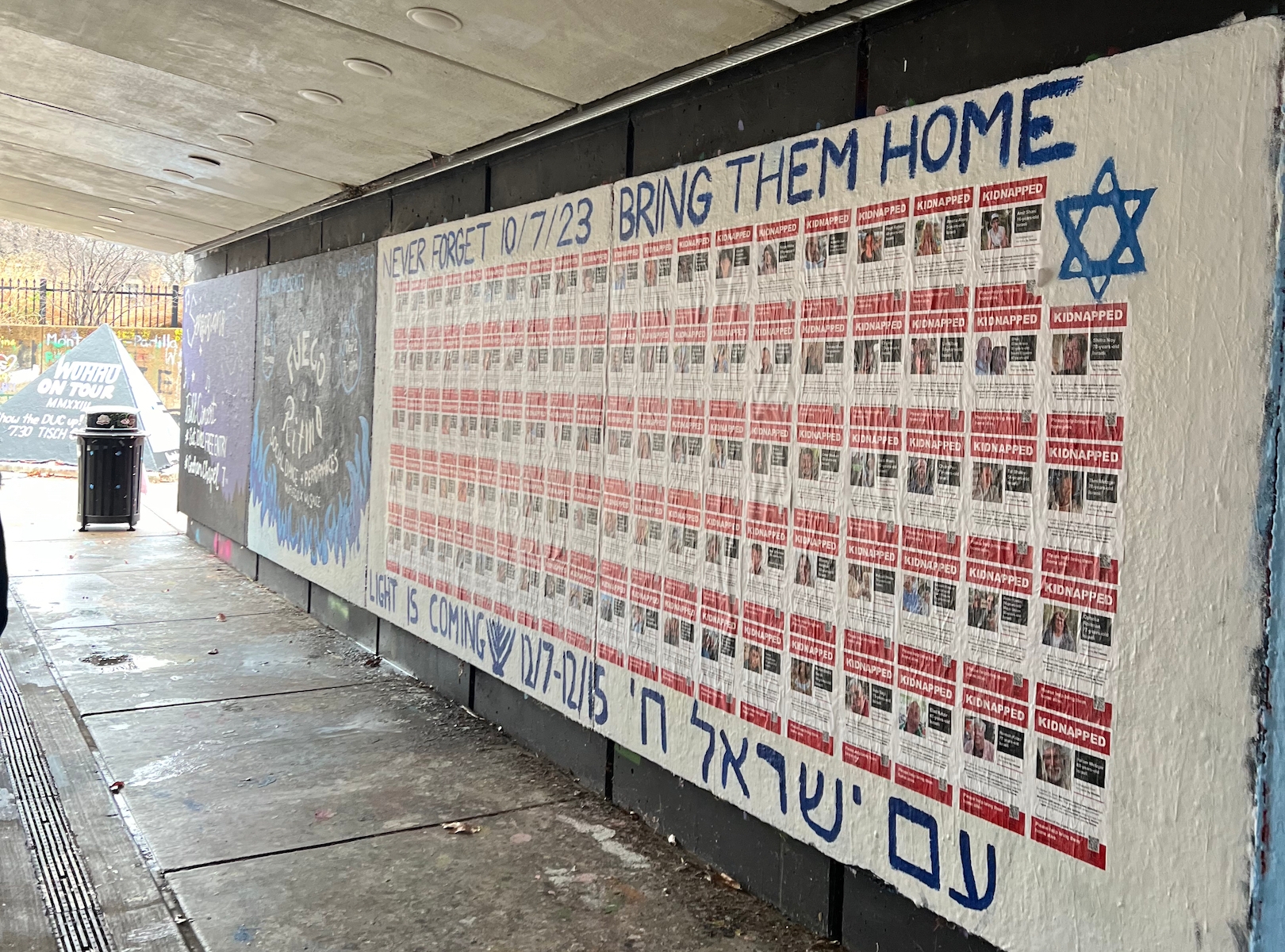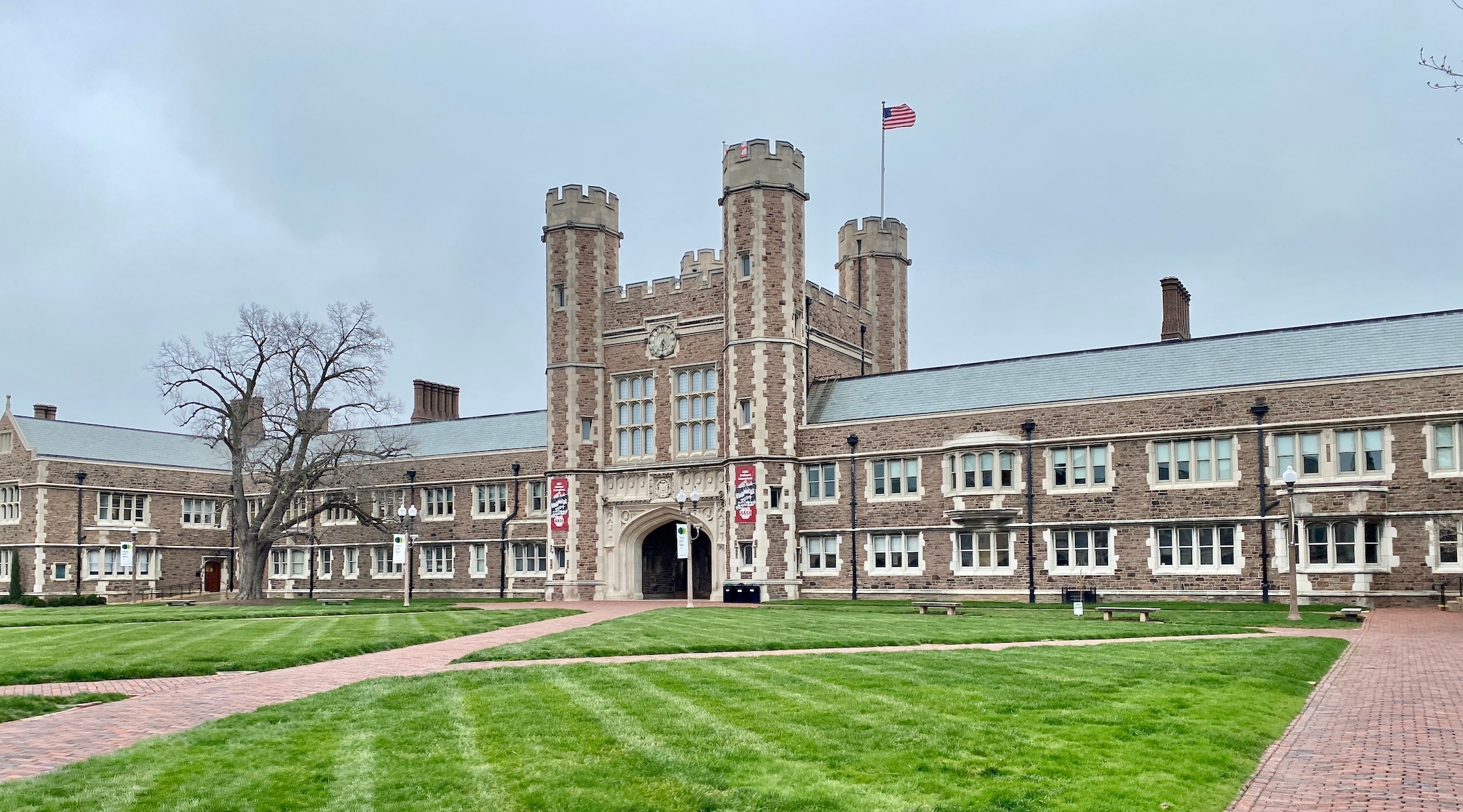During Lauren Eckstein’s freshman year at Pomona College, her grandparents pledged $1.2 million to the private school toward a scholarship to support refugee students.
They gave the money, a press release said at the time, in honor of their family’s own refugee background, having fled antisemitism in Europe.
That was in December 2022. Less than one year later, following the Oct. 7 Hamas attacks in Israel, Eckstein herself was looking to leave the Los Angeles college after experiencing antisemitism on a campus that was, and continues to be, a hotspot of pro-Palestinian activism.
“I had gone home and was finishing my semester online due to the targeted antisemitism I experienced,” she told the Jewish Telegraphic Agency.
Eckstein had already sensed campus hostility toward Israel prior to Oct. 7. But after the attacks, she recalled, her friends “started to give me dirty looks” following her decision to post pro-Israel messages on social media. She saw pro-Palestinian protesters staging demonstrations in dining halls and other common areas; she felt that university faculty, including her history professors, were backing the protesters. “I didn’t feel comfortable going back,” she said.
“I have a great deal of respect for my grandparents donating the money for refugees,” Eckstein said. But when it came to finding a comfortable atmosphere for herself as a Jewish student, she sought a safe haven halfway across the country: at Washington University in St. Louis.
For the last two years, Jewish college students looking to flee hostile environments on their campuses have had this under-the-radar option available to them. After the Oct. 7, 2023, attacks in Israel, WashU quietly introduced a program allowing students to transfer from other colleges for the spring semester, rather than waiting until the new school year.
The program did not explicitly cater to Jewish students, but some have taken advantage of it. According to the student paper, around 20 students in total have reportedly utilized the program, including Eckstein and several other Jewish students who said they left other prestigious schools over antisemitic environments. Six students transferred as part of the program this year.
“I’ve become very involved in the Jewish community here — another transfer and I are now co-presidents of Chabad, and I’m also on the Hillel board, and so I feel like I’m always doing things within the Jewish community, and a lot of my friends are Jewish,” Eckstein told the student paper. “I just feel very connected.”
WashU is one of a small number of colleges that have tried to appeal to Jewish students looking for friendlier pastures since Oct. 7. Brandeis University, a secular private school founded by and, in part, for Jews, extended its transfer application deadline last summer and saw 90 students opt to transfer.
Yeshiva University, the Modern Orthodox flagship in New York City, was buoyed by a $1 million donation from NFL owner Robert Kraft specifically to encourage transfer students. It said this fall that its admissions have spiked since the attacks.
And a number of Christian colleges, including schools with little to no programming or infrastructure for Jewish campus life, have also made direct transfer appeals to Jewish students or hired Jewish staff away from secular universities since Oct. 7.
To be eligible for WashU’s program, a spring transfer student needs to have completed at least one prior semester of college. Only the university’s Arts and Sciences college is eligible to accept transfers.
News about WashU’s program circulated in the Facebook group Mothers Against College Antisemitism and on the message board College Confidential, but the university administration isn’t exactly advertising it. A spokesperson declined to provide any information to JTA about the transfer program, its number of applicants, acceptance rate or how it has affected Jewish students, beyond insisting it was open to all interested transfers.
Official communication about the program is so scant that, when reached for comment this week, the WashU spokesperson initially said the school was cancelling it due to lack of interest. Hours later, the spokesperson reversed course and said the program would in fact continue.
Yet for the Jewish students who felt stranded without allies on other campuses after Oct. 7, WashU has become something of a respite.
“I think the administration has set a positive tone,” said Rabbi Hershey Novack, co-director of WashU’s Chabad center, which has attracted multiple transfer students: Both of its current student co-presidents, including Eckstein, used the spring transfer program.
WashU does not have the same Jewish roots or identity as Brandeis or Y.U., but it has a large Jewish population (a quarter of the student body is Jewish, according to Hillel). That may be why its transfer policy appealed to Jewish students even if it didn’t explicitly reach out to them.
Novack said that he’d been surprised at the news the school had launched a spring transfer pilot after Oct. 7, expecting that such a program would ordinarily take years to develop. At least six of the approximately 20 spring transfer students to date are Jewish, coming from other private schools like Occidental College in Los Angeles, according to reports in the student newspaper.
“I felt like an outcast for my political views and Judaism, and I felt uncomfortable. Not as much physically unsafe, but very much mentally,” one of those students told the student paper last year about why she transferred from her old school.

A mural memorializing Israeli hostages on the campus of Washington University in St. Louis, Missouri, shortly after Oct. 7, 2023. (Courtesy of Lauren Eckstein)
WashU hasn’t been immune to tensions over the Israel-Hamas war. The school, like many others, briefly had a pro-Palestinian encampment which some students and faculty were suspended for participating in; students there have also pushed to divest from Israel. Last year the student government passed a resolution calling on the university to divest from Boeing, citing its ties to Israel.
The school’s Hillel — whose director did not respond to repeated requests for comment — has accused at least one faculty member of promoting “anti-Israel bias.” That professor, shortly after the attacks, described the vandalism of the home of a member of the pro-Israel lobbying group AIPAC as “pretty cool.”
But WashU’s chancellor, Andrew Martin, also issued communications opposing antisemitic language and actions, including stating that the disputed phrase “From the river to the sea” is “well understood by most in our community” to be associated with “hatred.”
“To use that phrase, particularly in circumstances where we know it will have a harmful impact, is well beneath the dignity of every member of our community,” Martin, who teaches classes on free speech, wrote in November 2023. “This type of language does not build understanding; its contribution to the community is ill will, anger, distress, and sadness.”
Such actions endeared the school to Jewish groups like the Anti-Defamation League, which gave WashU a “B” — a relatively high grade — in its new (and controversial) “campus antisemitism report card” database.
Martin also made a point of visiting a Chabad event for parents and families weeks after the attacks, to assure families the university was taking steps to make its Jewish students feel welcome. This gesture was appreciated, Novack said.
“Ultimately it comes down to leadership,” the rabbi added. “And the university here has capable and effective leaders who have condemned antisemitism early and often.”
After hearing about WashU’s transfer program, Eckstein visited campus and was won over by its “large and thriving Chabad and Hillel.” She also saw a display of hostage posters in a heavily trafficked area leading to dormitories that she found “incredibly moving.” WashU was the only school to which she applied for a transfer. The transfer program, she said, “helped me and other Jewish students enter a community where we truly belong.”
Novack hopes the school can set an example for what a welcoming college feels like.
“My hope is that campuses will calm down over time,” Novack said. “There’s no reason for WashU to have a monopoly on providing a safe space for all her students. It should be the baseline for every campus in America.”
Correction: An earlier version of this article incorrectly reported that WashU’s chancellor visited the school Chabad for a prospective students weekend after the Oct. 7 attacks. In fact, it was for a parents and families weekend.
JTA has documented Jewish history in real-time for over a century. Keep our journalism strong by joining us in supporting independent, award-winning reporting.






